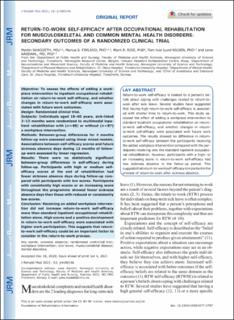| dc.contributor.author | Skagseth, Martin | |
| dc.contributor.author | Fimland, Marius Steiro | |
| dc.contributor.author | Rise, Marit By | |
| dc.contributor.author | Lund Nilsen, Tom Ivar | |
| dc.contributor.author | Aasdahl, Lene | |
| dc.date.accessioned | 2021-03-10T14:11:19Z | |
| dc.date.available | 2021-03-10T14:11:19Z | |
| dc.date.created | 2021-01-19T17:56:08Z | |
| dc.date.issued | 2021 | |
| dc.identifier.issn | 1650-1977 | |
| dc.identifier.uri | https://hdl.handle.net/11250/2732678 | |
| dc.description.abstract | Objective: To assess the effects of adding a workplace intervention to inpatient occupational rehabilitation on return-to-work self-efficacy, and whether changes in return-to-work self-efficacy were associated with future work outcomes.
Design: Randomized clinical trial.
Subjects: Individuals aged 18 60 years, sick-listed 2 12 months were randomized to multimodal inpatient rehabilitation with (n?=?88) or without (n?=?87) a workplace intervention.
Methods: Between-group differences for 4 months follow-up were assessed using linear mixed models. Associations between self-efficacy scores and future sickness absence days during 12 months of follow-up were assessed by linear regression.
Results: There were no statistically significant between-group differences in self-efficacy during follow-up. Participants with high or medium self-efficacy scores at the end of rehabilitation had fewer sickness absence days during follow-up compared with participants with low scores. Participants with consistently high scores or an increasing score throughout the programme showed fewer sickness absence days than those with reduced or consistently low scores.
Conclusion: Receiving an added workplace intervention did not increase return-to-work self-efficacy more than standard inpatient occupational rehabilitation alone. High scores and a positive development in return-to-work self-efficacy were associated with higher work participation. This suggests that return-to-work self-efficacy could be an important factor to consider in the return-to-work process. | en_US |
| dc.language.iso | eng | en_US |
| dc.publisher | Foundation for Rehabilitation Information | en_US |
| dc.rights | Navngivelse-Ikkekommersiell 4.0 Internasjonal | * |
| dc.rights.uri | http://creativecommons.org/licenses/by-nc/4.0/deed.no | * |
| dc.title | Return to work self-efficacy after occupational rehabilitation for musculoskeletal- and common mental health disorders: secondary outcomes of a randomized clinical trial. | en_US |
| dc.type | Peer reviewed | en_US |
| dc.type | Journal article | en_US |
| dc.description.version | publishedVersion | en_US |
| dc.source.journal | Journal of Rehabilitation Medicine | en_US |
| dc.identifier.doi | 10.2340/16501977-2787 | |
| dc.identifier.cristin | 1874721 | |
| cristin.ispublished | true | |
| cristin.fulltext | original | |
| cristin.qualitycode | 1 | |

